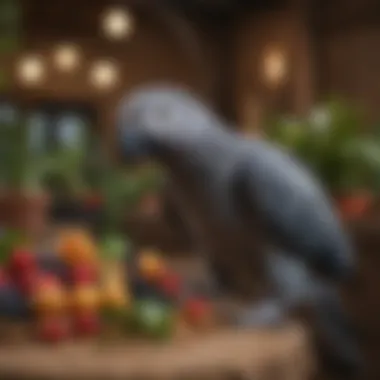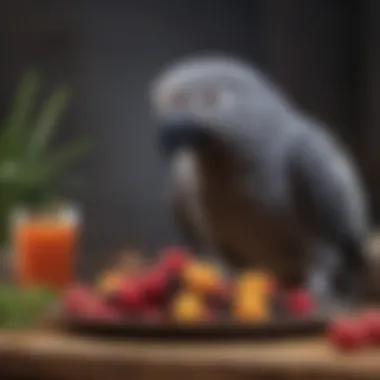NutriBerries for African Grey Parrots: A Nutritional Guide


Intro
This guide aims to provide an in-depth understanding of NutriBerries for African Grey parrots. These birds are known for their intelligence and unique dietary needs. Thus, it's essential to comprehend how NutriBerries can impact their health positively.
NutriBerries offer a convenient way to deliver essential nutrients to these birds. However, not all treats are equal. We will examine the ingredients, recommended feeding practices, and the significance of a varied diet. Understanding these elements will benefit both the pet and owner.
Understanding Your Pet
Pet Behavior Basics
African Grey parrots exhibit remarkable intelligence. They can learn to mimic sounds and human speech. Understanding their behavior can help owners meet their emotional and social needs. These birds often require stimulation and interaction, making play a vital part of their daily routine.
Common Breed Characteristics
Known for their gray plumage and striking red tails, African Greys are often considered the most intelligent of all parrot species. They can form strong bonds with their owners but may also develop separation anxiety if not properly socialized.
Species-Specific Needs
Nutritional needs vary significantly among bird species. African Greys require a balanced diet rich in vegetables, fruits, and seeds. Including NutriBerries can enhance their diet, but they should not be the sole source of nutrition. Offering a variety of foods is crucial for optimal health.
Nutritional Benefits of NutriBerries
NutriBerries are formulated to meet the unique dietary requirements of African Grey parrots. They provide essential vitamins and minerals critical for maintaining overall health. Understanding their composition helps owners make informed decisions about their pet's diet.
- Recipe Transparency: NutriBerries typically include seeds, grains, and fortified nutrients. Check the label for specific ingredients.
- Digestibility: The small sizes facilitate easier consumption, aiding in digestion and nutrient absorption.
- Energy Source: The blend of ingredients offers steady energy throughout the day, which is especially important for active birds.
It's important to integrate NutriBerries as part of a varied diet, not the sole source of nutrition.
Feeding Guidelines
When incorporating NutriBerries into an African Grey’s diet, consider the following:
- Portion Control: Follow the feeding guidelines on the packaging. Overfeeding can lead to obesity and health complications.
- Frequency: Introduce NutriBerries gradually. Monitor how your bird responds before making it a regular part of the diet.
- Balance: Always provide fresh fruits, vegetables, and other healthy foods alongside NutriBerries.
Health and Wellness
Maintaining the health of African Greys encompasses more than just their diet. Routine vet check-ups are crucial. Vaccinations should be administered according to a vet's advice. Recognizing early signs of illness can lead to quicker interventions.
Understanding the African Grey Parrot
Understanding the African Grey parrot is fundamental to grasping the importance of NutriBerries in their diet. These birds are renowned for their intelligence and social behavior, making them unique companions. By recognizing their specific needs, pet owners can make better dietary choices that promote overall well-being.
Physical Characteristics
African Grey parrots showcase a range of physical traits that make them easily identifiable. They typically boast a striking grey plumage with a bright red tail and a set of white facial features. Adult African Greys can grow up to 12 to 14 inches in length, exhibiting a strong, curved beak designed for cracking nuts and seeds. Their wingspans are impressive, measuring approximately 18 to 24 inches. These characteristics not only enhance their beauty but also provide insight into their natural behaviors. Understanding these traits can help owners create an optimal living environment that meets their physical needs.
Behavior and Intelligence
Behaviorally, African Grey parrots are known for their high levels of intelligence. They are capable of mimicking human speech and sounds with remarkable accuracy. This ability comes from their keen observational skills and social nature. Consequently, these birds thrive on interaction and mental stimulation. This intelligence also means they require more engaging activities than simpler parrot species. Providing them with toys, puzzles, and social interactions can help to keep their minds active and healthy. Ignoring their need for cognitive challenges can lead to boredom and potential behavioral issues.
Dietary Requirements


The dietary needs of African Grey parrots are specific and can significantly affect their health. In the wild, they primarily consume a varied diet of fruits, nuts, seeds, and vegetation. This diversity ensures they receive essential vitamins and minerals. When it comes to a pet African Grey, it's crucial to balance their diet with high-quality pellets, fresh fruits, and vegetables. Nutritional deficiencies can result in serious health problems, including feather plucking and respiratory issues.
Incorporating NutriBerries into their diet can help meet these dietary requirements. These treats are designed to provide key nutrients that are often challenging to achieve through conventional food options alone. By integrating nutritional treats, pet owners can support the overall health and vitality of their African Grey parrots.
Prologue to NutriBerries
NutriBerries serve as a significant dietary option for African Grey parrots, combining convenience with nutritional support. Understanding what NutriBerries are can help pet owners make informed choices about their birds' diets. These nutrient-dense treats are designed to meet the complex dietary needs of parrots. They provide a balanced mix of essential components that help maintain good health.
What Are NutriBerries?
NutriBerries are a unique form of parrot food, available from several brands, including Lafeber. They are formulated with a blend of seeds, grains, and various nutrients, shaped into small, berry-like morsels. These treats are aimed at providing optimal nutrition while addressing the natural foraging instincts of African Grey parrots. Unlike traditional pellets, NutriBerries can be easier for parrots to pick up and enjoy, offering a more interactive feeding experience.
Nutritional Composition
The nutritional makeup of NutriBerries is designed to support the health and well-being of African Grey parrots in multiple ways. It’s crucial to explore each component for a comprehensive understanding.
Vitamins and Minerals
Vitamins and minerals are critical elements in NutriBerries. They provide essential nutrients that support the immune system and overall health. For instance, Vitamin A is important for good vision and healthy skin, while Calcium is vital for strong bones and beaks. The specific blend of these vitamins and minerals makes NutriBerries a beneficial choice for maintaining the health of your African Grey parrot. Moreover, the fortification of these treats helps to ensure that parrots receive a balanced diet, particularly in cases where natural foraging might not be sufficient.
Protein and Fiber Content
Both protein and fiber are also fundamental in the formulation of NutriBerries. Protein is essential for growth, feather condition, and overall energy. The inclusion of pea protein and other sources means that parrots can get enough of this important nutrient. Fiber, on the other hand, aids in digestion and helps maintain a healthy weight. This combination is advantageous as it meets the needs of active African Grey parrots, who require a diet rich in varied nutrients.
Role of Fats
The role of fats in NutriBerries cannot be overlooked. Healthy fats support feather health and provide essential fatty acids that are important for skin health. The carefully selected fats in NutriBerries, like flaxseed oil, contribute to the energy levels required for active parrots. Ensuring the right balance of fats helps avoid potential issues such as obesity, making NutriBerries a sound choice for pet owners looking for nutritious treats that cater to the needs of their birds.
Manufacturing Process
Understanding the manufacturing process of NutriBerries can clarify why these treats are a preferred option among pet owners. NutriBerries are made using cooking and extrusion processes that retain the nutritional integrity of the ingredients. These production methods ensure that essential nutrients are preserved while creating a tasty and appealing product for parrots. This is vital for encouraging feeding in birds that may be picky or require variety in their diet.
NutriBerries not only meet the nutritional needs of African Greys but also engage their natural foraging behaviors, making mealtime more stimulating.
By focusing on both the formulation and production of NutriBerries, pet owners can appreciate the thoughtfulness behind these products. Incorporating them into a diet can offer a tangible way to enhance the health and enjoyment of African Grey parrots.
Benefits of NutriBerries for African Grey Parrots
NutriBerries play a pivotal role in the nutrition and care of African Grey parrots. The blend of ingredients and nutrient composition provides numerous advantages for these intelligent birds. Understanding these benefits can guide pet owners in making informed dietary choices for their companions.
Enhanced Nutritional Support
NutriBerries are enriched with vital nutrients that support the overall health of African Grey parrots. Each berry is designed to deliver a well-rounded diet. This includes a blend of essential vitamins and minerals, which are critical for maintaining strong immune systems and contributing to the overall vitality of the birds.
The nutritional formula in NutriBerries typically includes Vitamin A, crucial for good vision and skin health. Other vitamins, such as Vitamin D and E, play key roles in calcium metabolism and antioxidant protection. Integrating NutriBerries into their diet ensures that African Grey parrots receive not just the basic nutrients but also additional support for long-term health.
"A varied diet, incorporating specialized products like NutriBerries, can help avoid many common health issues in parrots."
Behavioral Enrichment
African Grey parrots are known for their high intelligence and need for mental stimulation. Feeding them NutriBerries can enhance their behavioral health. The berries encourage natural foraging behaviors, offering physical activity as they work to extract the food. This simulates a more natural environment.


Moreover, the unique shapes and textures of NutriBerries help to maintain interest in their food. Engaging with food affects their willingness to explore different flavors, which contributes to their overall enjoyment. A mentally stimulated parrot is often more well-adjusted and less prone to behavioral issues.
Convenience for Pet Owners
For pet owners, NutriBerries provide a convenient feeding option. They are easy to store and serve, which simplifies the daily feeding routine. Unlike other food forms, such as fresh fruits and vegetables, which require preparation and careful measurement, NutriBerries can be simply poured into a dish. This aspect makes it easier for those with busy lifestyles to ensure their pets receive a balanced diet.
Additionally, the packaging typically offers clear feeding guidelines. This allows pet owners to understand how much to feed their bird without the guesswork. Knowing that NutriBerries are nutritionally balanced provides peace of mind, allowing owners to focus on their relationship with their African Grey rather than worrying excessively about diet management.
Feeding Guidelines for NutriBerries
Understanding the feeding guidelines for NutriBerries is essential for maintaining the health and vitality of African Grey parrots. These parrots are known for their intelligence and require a well-balanced diet to support their complex needs. NutriBerries can be an excellent source of nutrition, but it is crucial to combine them correctly with other food types and monitor their intake.
Daily Serving Recommendations
Getting the right daily serving of NutriBerries is vital to avoid either underfeeding or overfeeding your African Grey. Generally, a serving size can vary depending on the individual bird's age, weight, and activity level. A common recommendation is about 1/4 cup of NutriBerries per day per parrot. This amount can be adjusted slightly based on your bird's overall diet and behavior. Pay attention to your parrot’s body condition and energy levels. If you notice excessive weight gain or loss, it may be necessary to reassess their diet.
Combining with Other Foods
Fruits and Vegetables
Fruits and vegetables are significant in enriching the diet of African Greys. They provide crucial vitamins and minerals that might not be adequately supplied by NutriBerries alone. Fresh produce, such as carrots, spinach, and apples, enhances the overall nutritional profile. Fruits like berries can be beneficial because they offer antioxidants and hydration. However, some fruits are high in sugars and should be fed in moderation.
The best aspect of incorporating fruits and vegetables is that they stimulate natural foraging behavior. African Grey parrots enjoy picking and choosing their food, making mealtime an engaging experience. Ensure that any produce given is pesticide-free and washed thoroughly to remove harmful residues.
Pellets and Seeds
Pellets and seeds contribute significantly to a balanced diet. Quality pellets are specially formulated and provide a reliable source of essential nutrients. They complement NutriBerries well, ensuring that your African Grey gets adequate proteins and fatty acids. Seeds can also play a role but should be offered sparingly due to their high fat content.
A unique feature of pellets is that they come in various formulations, catering to specific dietary needs. This customization allows you to tailor your parrot's diet based on their health status. However, over-reliance on seeds can lead to obesity and nutritional deficiencies, so it is recommended to limit seed intake.
Monitoring Your Parrot’s Intake
Monitoring your African Grey's food intake is not just about quantity but also about observing how they respond to their diet. Note how much NutriBerries and other food types your parrot consumes daily. Regularly assess their droppings, activity level, and overall health. Changes in behavior or appetite can indicate dietary issues or health problems. Specific changes might require consultation with an avian vet for further evaluation.
Potential Concerns with NutriBerries
When introducing any new food item to the diet of African Grey parrots, it is essential to consider potential concerns associated with it. NutriBerries, while offering several benefits, come with their share of considerations regarding their use. Each aspect needs careful evaluation to ensure these parrots receive a balanced diet and that NutriBerries fit within their nutritional framework.
Ingredient Sensitivities
Like many food products, NutriBerries contain various ingredients that might not suit every African Grey. Some birds may experience sensitivities or allergies to specific components. Common ingredients in NutriBerries include grains, seeds, fruits, and vegetables. It is crucial for pet owners to be vigilant about their bird's reaction when introducing NutriBerries into their diet.
- First, observe any signs of allergic reactions, such as changes in behavior, feather plucking, or digestive issues.
- In some cases, a veterinarian can perform tests to identify specific allergens.
Owners should avoid feeding NutriBerries to birds with known sensitivities to ingredients like peanuts or soy. Identifying the right balance and ensuring that the primary ingredients align with the dietary needs of African Greys is vital for their health.
Overreliance on Treats
NutriBerries are often perceived as treats due to their distinct shape and appealing appearance. However, overreliance on NutriBerries as the primary food source can lead to imbalances in an African Grey's diet. While these berries are packed with essential nutrients, they cannot replace the variety of fresh foods, pellets, and seeds crucial for optimal health.
- It is essential to limit the amount of NutriBerries given daily.
- They should act as a supplement, not a substitute for a well-rounded diet.


Pet owners should ensure they are aware of portion control guidelines and maintain a diverse diet for their birds. This helps prevent issues related to nutritional deficiencies or obesity that may arise from excessive treat intake.
Cost Considerations
Finally, the cost of NutriBerries can be a significant factor for many bird owners. These products tend to be priced higher compared to traditional seeds and other bird foods. This cost impact may lead to concerns for long-term feeding strategies. As pet owners budget for their birds' dietary needs, it’s essential to weigh the benefits of NutriBerries against their price.
- Consider the frequency of feeding NutriBerries and adjust other food types accordingly to maintain overall budgetary balance.
- Explore bulk purchase options or sales promotions from various retailers to make them more affordable.
This evaluation can help pet owners find an economical way to include NutriBerries while ensuring their African Grey receives necessary nutrients without overspending.
In summary, understanding these potential concerns can greatly enhance the feeding strategy for NutriBerries, making it beneficial for both the bird and owner.
Alternatives to NutriBerries
Exploring alternatives to NutriBerries is fundamental when considering the overall nutrition of African Grey parrots. While NutriBerries offer numerous positive attributes, a varied diet is crucial for ensuring the long-term health and well-being of these intelligent birds. Incorporating alternatives helps to minimize the risk of ingredient sensitivities and promotes a more balanced intake of essential nutrients. This section will highlight different types of nutritional options that can effectively complement or replace NutriBerries in your parrot’s diet.
Homemade Nutritional Options
Homemade nutritional options provide a tailored and fresh diet for African Grey parrots. Preparing your own bird food allows pet owners to control the quality of ingredients used. This is important, as some commercial options can contain fillers or additives that may not be suitable for all parrots.
To create a balanced homemade mix, consider the following ingredients:
- Fresh fruits: apples, bananas, and berries.
- Vegetables: carrots, spinach, and sweet potatoes.
- Grains: cooked quinoa or brown rice.
- Seeds: sunflower seeds and pumpkin seeds can be added in moderation.
Ensure that all ingredients are washed and cut into appropriate sizes. You may also introduce a variety of herbs to enhance flavor and nutritional value, such as basil or parsley. The important point here is to maintain variety and nutrient balance while avoiding toxic foods like avocado and chocolate.
Commercial Parrot Foods
Commercial parrot foods can be a convenient option for those who prefer ready-made solutions. When selecting a brand, it is essential to choose high-quality products specifically formulated for African Grey parrots. Look for options that are a blend of pellets, seeds, and nuts. Pellets should comprise at least 50% of the diet, as they give a complete nutritional profile.
Recommendations for good commercial parrot foods include:
- Harrison’s Bird Foods.
- ZuPreem FruitBlend.
- Roudybush Daily Maintenance.
These brands offer varying textures, flavors, and essential nutrients that can attract picky eaters. However, always read labels and consult with a veterinarian to ensure that the chosen food meets your parrot’s specific needs.
Natural Treat Options
Natural treat options can serve as valuable supplements alongside NutriBerries. These treats not only provide enrichment but also contribute to a healthier diet. Things to consider include:
- Dried fruits: such as apples and mangos without added sugar.
- Nuts: like almonds or walnuts, but give in moderation due to high-fat content.
- Fresh herbs: small amounts can be an enjoyable and aromatic addition.
Presenting these treats as part of foraging activities can stimulate your African Grey’s natural instincts. Foraging increases cognitive function and can reduce the chances of behavioral issues. Always ensure that treats are suitable and should never replace the essential nutritional components of a balanced diet.
Increasing variety in your bird's diet is crucial to prevent boredom and nutritional imbalances.
The End
Summarizing the Importance of a Balanced Diet
A balanced diet is crucial for the overall health and longevity of African Grey parrots. These birds are known for their high intelligence and specific dietary needs. Feeding them a variety of nutrients ensures they remain active and mentally stimulated. A balanced diet also supports their immune system and reduces the risk of diseases. Owners must prioritize food diversity and nutrient-rich options to meet these needs effectively.
It's essential that nutriBerries, rich in essential vitamins, minerals, and proteins, supplement the birds' diets rather than serve as a sole nutrition source. A diverse intake encourages a holistic approach to health. This includes fruits, vegetables, and a well-balanced pellet mix alongside NutriBerries.
Final Thoughts on NutriBerries
NutriBerries serve as an appealing option for many African Grey owners. They satisfy not only the birds' nutritional needs but also engage their instinctual behaviors related to foraging. However, while NutriBerries are beneficial, they are not without limitations. Owners should remain vigilant in monitoring their parrot's overall diet to ensure it does not become overly reliant on these treats.
Furthermore, integrating NutriBerries with other healthy food options enhances the overall nutritional value of the diet. The goal must always be a well-rounded and diverse approach to feeding, fostering not only physical health but also behavioral enrichment. Investing time and resources into understanding and implementing correct feeding practices can greatly contribute to the well-being of African Grey parrots. Owners are encouraged to continually educate themselves and adjust their feeding strategies as needed.







